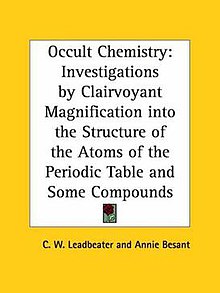
Annie Besant was a British socialist, theosophist, freemason, women's rights and Home Rule activist, educationist, and campaigner for Indian nationalism. She was an ardent supporter of both Irish and Indian self-rule. She became the first female president of the Indian National Congress in 1917.

Charles Webster Leadbeater was a member of the Theosophical Society, Co-Freemasonry, an author on occult subjects, and the co-initiator, with J. I. Wedgwood, of the Liberal Catholic Church.
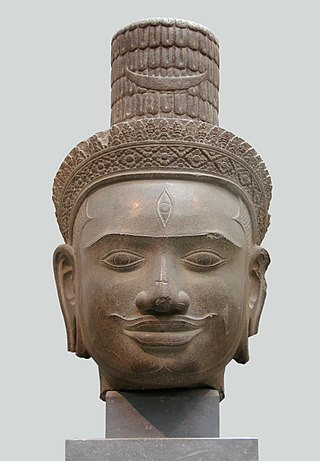
The third eye is an invisible eye, usually depicted as located on the forehead, which provides perception beyond ordinary sight. In Hinduism, the third eye refers to the ajna chakra. In both Hinduism and Buddhism, the third eye is said to be located around the middle of the forehead, slightly above the junction of the eyebrows, representing the enlightenment one achieves through meditation.
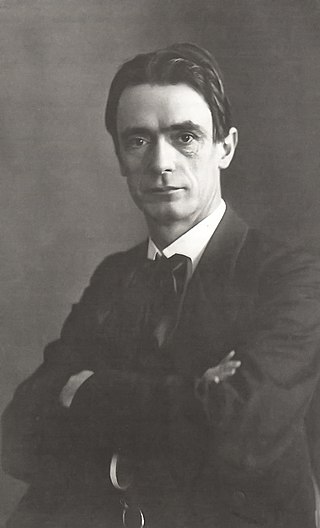
In the religion of Theosophy and the spiritual movement called Anthroposophy, the Akashic records are a compendium of all universal events, thoughts, words, emotions and intent ever to have occurred in the past, present, or future in terms of all entities and life forms, not just human. They are believed by theosophists to be encoded in a non-physical plane of existence known as the mental plane. Because it is believed that the records are encoded vibrationally into the inherent fabric of space, some have likened the mechanism as similar to how holograms are created. There is currently no scientific evidence for the existence of the Akashic records, and rigorous scientific research in this field has seen little traction.
In esoteric cosmology, a plane is conceived as a subtle state, level, or region of reality, each plane corresponding to some type, kind, or category of being.
The mental body is one of the subtle bodies in esoteric philosophies, in some religious teachings and in New Age thought. It is understood as a sort of body made up of thoughts, just as the emotional body consists of emotions and the physical body is made up of matter. In occult understanding, thoughts are not just subjective qualia, but have an existence apart from the associated physical organ, the brain.
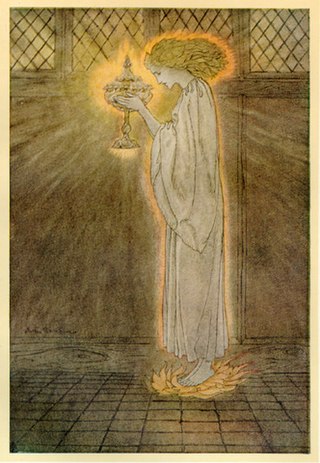
In neo-Theosophy, the etheric body, ether-body, or æther body is the subtle body propounded in esoteric philosophies as the first or lowest layer in the human energy field or aura. The etheric body is said to be in immediate contact with the physical body and to sustain it and connect it with "higher" bodies. It is also said to consist of a finer substance, more pure and composed of smaller particles, than the ordinary matter of the physical plane.
The etheric plane is a term introduced into Theosophy by Charles Webster Leadbeater and Annie Besant to represent the subtle part of the lower plane of existence. It represents the fourth [higher] subplane of the physical plane, the lower three being the states of solid, liquid, and gaseous matter. The idea was later used by authors such as Alice Bailey, Rudolf Steiner, Walter John Kilner and others.
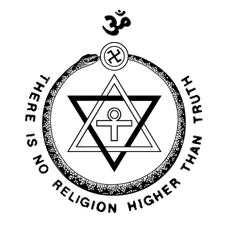
Morya, also spelt Maurya, is one of the "Masters of the Ancient Wisdom" within modern Theosophical beliefs. He is believed by followers of Theosophism to be one of the Mahatmas who inspired the founding of the Theosophical Society and was engaged in a correspondence with two English Theosophists living in India, A. P. Sinnett and A. O. Hume. The correspondence was published in 1923 by A. Trevor Barker, in the book The Mahatma Letters to A. P. Sinnett.

According to spiritual beliefs, an aura or energy field is a colored emanation said to enclose a human body or any animal or object. In some esoteric positions, the aura is described as a subtle body. Psychics and holistic medicine practitioners often claim to have the ability to see the size, color and type of vibration of an aura.

Rose is the color halfway between red and magenta on the HSV color wheel, also known as the RGB color wheel, on which it is at hue angle of 330 degrees.

Curuppumullage Jinarajadasa was a Ceylonese author, occultist, freemason and theosophist. The fourth president of the Theosophical Society, Jinarajadasa was one of the world's foremost Theosophical authors, having published more than 50 books and more than 1600 articles in periodicals during his life. His interests and writings included religion, philosophy, literature, art, science and occult chemistry. He was also a rare linguist, who had the ability to work in many European languages.

Neo-Theosophy is a term, originally derogatory, used by the followers of Helena Blavatsky to denominate the system of Theosophical ideas expounded by Annie Besant and Charles Webster Leadbeater following the death of Madame Blavatsky in 1891. This material differed in major respects from Blavatsky's original presentation, but it is accepted as genuinely Theosophical by many Theosophists around the world.

Ernest Egerton Wood was a noted English yogi, theosophist, Sanskrit scholar, and author of numerous books, including Concentration – An Approach to Meditation, Yoga and The Pinnacle of Indian Thought (1967).
Master Jesus is the theosophical concept of Jesus in theosophy and the Ascended Master Teachings.

In Theosophy, Maitreya or Lord Maitreya is an advanced spiritual entity and high-ranking member of a reputed hidden spiritual hierarchy, the Masters of the Ancient Wisdom. According to Theosophical doctrine, one of the hierarchy's functions is to oversee the evolution of humankind; in concert with this function Maitreya is said to hold the "Office of the World Teacher". Theosophical texts posit that the purpose of this Office is to facilitate the transfer of knowledge about the true constitution and workings of Existence to humankind. Humanity is thereby assisted on its presumed cyclical, but ever progressive, evolutionary path. Reputedly, one way the knowledge transfer is accomplished is by Maitreya occasionally manifesting or incarnating in the physical realm; the manifested entity then assumes the role of World Teacher of Humankind.
Dora Kunz née Theodora Sophia van Gelder was a Dutch-American writer, psychic, alternative healer, occultist and leader in the Theosophical Society in America. Kunz's works have been widely published in Dutch, English, French, German, Polish, Portuguese, and Spanish.

Man: Whence, How and Whither, A Record of Clairvoyant Investigation, published in 1913, is a theosophical book compiled by the second president of the Theosophical Society (TS) - Adyar, Annie Besant, and by a TS member, Charles W. Leadbeater. The book is a study on early times on planetary chains, beginnings of early root races, early civilizations and empires, and past lives of men.

Thought-Forms: A Record of Clairvoyant Investigation is a theosophical book compiled by the members of the Theosophical Society A. Besant and C. W. Leadbeater. It was originally published in 1905 in London. From the standpoint of Theosophy, it tells opinions regarding the visualization of thoughts, experiences, emotions and music. Drawings of the "thought-forms" were performed by John Varley Jr., Prince, and McFarlane.

Modern Theosophy has had considerable influence on the work of visual artists, particularly painters. Artists such as Wassily Kandinsky, Piet Mondrian, and Luigi Russolo chose Theosophy as the main ideological and philosophical basis of their work.
